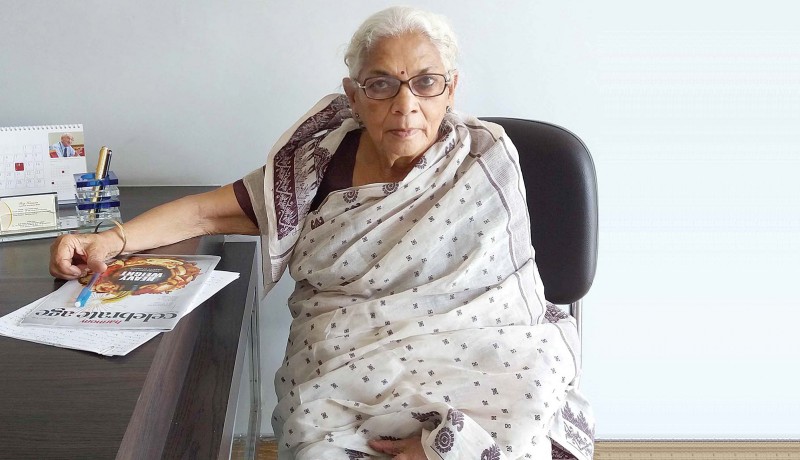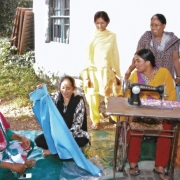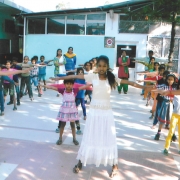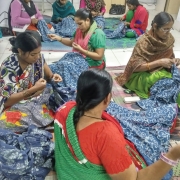
People

Helping underprivileged women build a future is Madhuri Mathur’s way of saying ‘thank you’, writes Raj Kanwar
It was 1957 and a 23 year-old Madhuri (then Jayal, now Mathur) had just returned to Dehradun from Delhi with a degree in education from the famed Lady Irwin College. As she stood on the threshold of a new career, she wondered what the future held for her.
Hailing from the distinguished Jayal clan in Dehradun, a teaching job in an elite school was the obvious choice for a young lady of such grooming and poise. And thus she came to be hired to teach at the then fledgling Welham Girls School, a boarding school, where in due course she became vice-principal.
As much as she loved teaching, that was not Madhuri’s only calling. Dehradun was then a small town and, somewhere down the line, she met the Lakhanpals—Satyavrat and Chandravati, both educators and members of the Rajya Sabha. She quickly fell under the influence of this khadi-wearing couple and, like them, became a great believer in ‘giving’.
The result of her soul-searching eventually led Madhuri to launch a charitable society, Mahila Kalyan Udyog Kendra (MKUK), in 1962 along with her mother, the Lakhanpals and local businessman-cum-philanthropist Jai Ram Singh Oberai as founding members. Madhuri became its honorary secretary, a post she holds even today. The NGO had a noble yet simple objective: to train underprivileged and destitute women in various crafts and skills that would equip them with the means to earn a livelihood. The centre began functioning at Madhuri’s spacious family home and continues to operate from there.
The first woman to enrol with the centre was Kailashvati, a Punjabi refugee who had arrived in India as a teenager with her mother and brother from Pakistan after Partition. Her father, husband and son had been killed during the riots of the time and MKUK was a godsend for her. The centre enrolled Kailashvati at the Bapu Industrial Home set up by the state government specifically to provide training to refugee women in various skills such as tailoring, knitting and secretarial practice. As a result, she was employed as an instructor at the centre to train other women in tailoring skills.
By word-of-mouth, more and more women learnt about MKUK and its activities. Vidyavati, a widow in her early 20s with two sons, was the second woman to join the centre. She too was trained in tailoring and employed as an instructor. With her salary, she managed to provide a decent education to her sons; today, one of them is an IPS officer and the other well-settled as well. “I will never forget the time Vidyavati met me a year later and touched my feet,” recalls Madhuri, now 83. “I saw tears of happiness and gratitude in her eyes. That brought tears to my eyes too. Vidyavati worked for 30 years at the centre and then her son took her away.”
The centre made steady progress; in a few months after it was established, it acquired seven sewing machines and its strength had risen to 30, comprising migrant labourers and a couple of refugees. MKUK’s turning point came when it landed its first major contract: stitching the uniforms of the local municipality’s Class IV employees. This was followed by similar but bigger orders, from the Survey of India and the National Institute of Visually Handicapped.
However, what firmly established the centre in the business of sewing and supply of uniforms was the decision of Welham Girls’ School to get MKUK to sew the uniforms (salwars and shirts only) of all its students. The school went a step further and, in 1990, began to outsource to Madhuri’s centre the sewing contract for the entire set of school uniforms, including blazers, pullovers, shoes, socks and undergarments. This was a huge and prestigious business and it expanded MKUK’s scope of operations considerably. The order for uniforms on such a large scale was a formidable task for Madhuri, a novice to business, yet she boldly took up the challenge. “For me, becoming a minor entrepreneur was a new learning experience. Slowly but surely, I learnt the logistics of the business,” she recalls with satisfaction.
What inspired Madhuri to undertake a mission like this? “Even though our family is highly educated, accomplished and well-off, our upbringing and ethos were essentially middle class,” she explains. “Having grown up in such an environment, I had decided early on that education was going to be my area of focus.” Clearly, compassion was at the core of Madhuri’s calling. “Over all these years, we have helped uneducated women acquire useful skills and ensure that at least their children were educated. In this way, we helped many women earn their own livelihood, and young girls find suitable careers. Interacting with all these women is emotionally satisfying, and that is my greatest motivation.”
The contract with the Welham Girls’ School continued till 2000, by which time the number of students had risen to about 600. When Madhuri retired after 39 years in 1996, she was the vice-principal. She was now ready to take her next leap of faith.
She did this when she launched Kar Kamal, a unit which hosts annual exhibition-cum-sales to promote the items made by MKUK members. Other NGOs engaged in promoting social causes were also encouraged to set up sales booths. The first exhibition in 2004 was a roaring success and the centre made a net profit of over ₹ 300,000; the event has since become a major item on Dehradun’s social calendar.
Madhuri didn’t stop there. She and her team decided to widen the scope of their activities and opened a coaching school for children in 2007. The school, located at Srijan Public School in Bapu Nagar in the Jakhan area, offers extra coaching to children from neighbouring villages and basti, from 3 to 5 pm, four days a week. The centre, which has seen 300 children pass through its portals, now has 60 kids on its rolls.
Simultaneously, MKUK launched a project to promote the welfare and education of girls from underprivileged families. Selected deserving girls are admitted to regular schools and their education, is paid for by the society. After they complete their schooling, they are encouraged to join professional training and basic courses. This, too, is fully funded by the centre.
Not surprisingly, in the 53 years since it was founded, MKUK has won the hearts and confidence of the people and organisations it has worked with. Among them is Avdhash Kaushal, founder chairperson of Rural Litigation Entitlement Kendra, a Dehradun-based NGO that works on the economic and social problems of the underprivileged. “I have followed MKUK’s work for years,” he says. “It is amazing how its office bearers, many of whom are in their 70s and 80s, have been indefatigably carrying aloft the banner for so many years. Their tireless energy can shame women half their age.”
Adds Neelu Khanna, secretary, Aasraa Trust, Dehradun, “MKUK deserves to be commended for the great work it has been doing in training women to give them a life of dignity. Equally praiseworthy is its role in educating girls from poor families and ensuring that they join professional courses to be able to stand on their own feet. I congratulate Ms Madhuri Mathur and her team for their commendable work.”
Indeed, MKUK has had a life-changing impact on a large number of women and has changed the course of the next generation of the women it has helped. One of them, Ruksana, is a master craftswoman in crochet and has been working for MKUK for five years. One of her three daughters has a degree in computer applications and is working with Wipro in Pune. Another daughter is on the verge of completing her MBA from the Institute of Cooperative Management while the third is doing her BSc at a local college.
Ruksana sums up the essence of Madhuri’s life’s work when she says, “The centre has paid all the fees for their professional courses and taken care of related expenses. Madhuri Ma’am has built the future of my children. I had never dreamt that my daughters would have such an education. Without her help, they would have remained uneducated like me.”
Photo: Amit Sharma Archival Photographs courtesy: Madhuri Mathur Featured in Harmony — Celebrate Age Magazine August 2017
you may also like to read
-
For the love of Sanskrit
During her 60s, if you had told Sushila A that she would be securing a doctorate in Sanskrit in the….
-
Style sensation
Meet Instagram star Moon Lin Cocking a snook at ageism, this nonagenarian Taiwanese woman is slaying street fashion like….
-
Beauty and her beast
Meet Instagram star Linda Rodin Most beauty and style influencers on Instagram hope to launch their beauty line someday…..
-
Cooking up a storm!
Meet Instagram star Shanthi Ramachandran In today’s web-fuelled world, you can now get recipes for your favourite dishes at….










